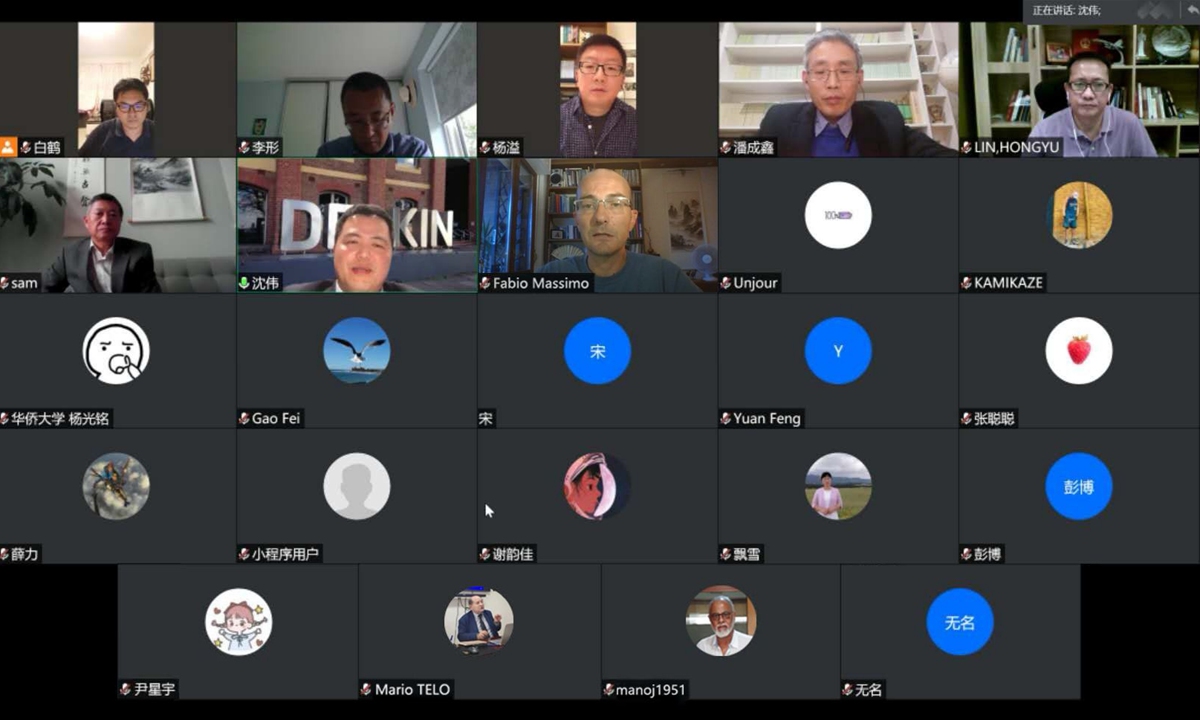World experts express grim views of US COVID-19 reaction
Source: Global Times Published: 2020/9/2 17:39:27

Photo: A screenshot of the webinar
Editor's Note:In late August, experts from Asia, Europe and America attended a webinar co-hosted by the Forum on Politics and International Relations and the College of International Relations/Institute of Overseas Chinese, Huaqiao University to discuss the US handling of the raging COVID-19 pandemic and the impact on China-US relations. The Global Times selected the opinion of three participants.
Mario Telo, a professor from Université Libre de Bruxelles
The COVID-19 crisis has shown the dramatic discrepancy between the scale of the current transnational challenges (public health, climate change, security, financial stability, extreme poverty, sustainable development, terrorism…) and the weakness of global governance. This gap was visible even before, but became evident in 2020. The US, Brazil, India and the UK are led by right-wing nationalist leaders who denied the relevance of the COVID-19 challenge. Nationalism and power politics are coming back in their worst forms - against both natural and social science that show the transnational characteristics of public health.
The US is not only cutting its contribution to the World Health Organization (WHO) budget, but is also leaving the organization. Such a behavior in the middle of a global pandemic, like the US leading intellectual Joseph Nye said recently at a conference in Venice, has to do with the collapse of morality.
How to promote a change? The critical factor will be the capacity of detailing not only what to do, but firstly how to do - how to improve UN agencies efficiency and legitimacy. Reforms of the modes and levels of governance must be the main objective, affecting the UN institutions and the WHO decision-making process.
Manoj Joshi, a distinguished fellow at the Observer Research Foundation
The impact of COVID-19 in the services-dominated US economy has been severe. The IMF's June 2020 World Economic Outlook Growth projections see US GDP growth down to -8 percent this year, while China is the only economy that shows a +1 percent growth.
The difference between the two is because of the way they handled the infection. China instituted large-scale quarantines, social distancing and prompt treatment to those affected. The US handling was marred by poor political leadership and the inevitable consequences of its federal governance system where each state decides its own rules.
The US failed on several counts. It was not able to ramp up testing fast enough, despite being the highest ranked country in the Global Health Security Index. Missteps by the Trump administration, as well as malfunctioning tests, led to delayed responses.
There have also been other systemic problems. 28 million people lack health insurance in the US and would have had to pay for their own treatment and so people with milder symptoms were unwilling to isolate themselves because 25 percent of American workers do not have paid sick leave. Many undocumented immigrants who feared deportation stayed away from hospitals even after they were infected.
Trump accused those who were raising the alarm of trying to undermine his presidency. In turn the Democrats accused him of failing to respond adequately to the threat and politicizing it. There is no universal masking mandate in the country. Further, playing into his election politics, Trump has discouraged social distancing, an important means of fighting the infection.
Zhao Suisheng, a professor at the University of Denver
There are many discussions about the US systematic flaws reflected from the COVID-19 pandemic. Actually, once the US system is mobilized, it can achieve many results. Unfortunately, the core of the US failure in handling the pandemic is the failure of the US leadership. From the very beginning, Trump showed no interest in fighting the pandemic but only his re-election, so he made the issue a political one. As long as Trump is the president, the pandemic can hardly be put under control.
Now China and the US have entered an all-out confrontation, including the spheres of politics, economy, culture and technology. In this process, ideology has played a major role. As long as Trump is re-elected, this confrontation cannot be eased. What I fear is that the two countries will each form their own way of doing things, which will lead to non-cooperation in many issues. The pandemic is the very example which turns out to be a zero-sum game.
China should pay attention to the domestic politics in the US. Misunderstanding between the two will make one difficult to predict the behavior of the other, thus enable to carry out reasonable policies to solve problems.
Posted in: VIEWPOINT